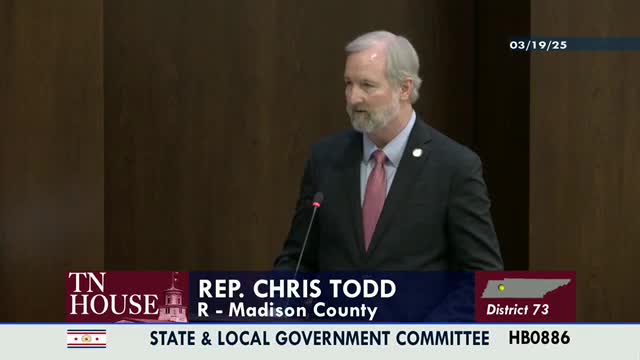Committee advances bill to require party registration for primary voting after heated debate and public testimony
Get AI-powered insights, summaries, and transcripts
Subscribe
Summary
The State and Local Government Committee advanced House Bill 886 on a 13-7-1 vote, a measure that would require voters to declare party affiliation to participate in party primaries starting Nov. 1.
The State and Local Government Committee advanced House Bill 886 on a 13-7-1 vote after more than three hours of debate and public testimony, sending the measure to the Finance, Ways and Means Committee.
Sponsor Rep. Todd said the bill would require voters to register their party affiliation beginning Nov. 1 to participate in party primaries, and that the change is intended to make party membership “affirmative” and reduce cross-over voting. "It is up to 90 days prior to the election date for a primary," Todd said, describing when a change of affiliation must be submitted to affect a given primary.
The measure prompted sustained pushback on the committee floor and from witnesses. Debbie Gould, president of the League of Women Voters of Tennessee, testified in opposition and warned closed primaries could “further reduce what is already a dismal voter participation rate in our state.” Stephen Puckett and other citizens described concerns about harassment, data misuse and being solicited to vote in primaries for which they were not registered.
Opponents on the committee said the bill would increase partisanship and limit flexibility for voters who choose candidates across party lines. Representative Powell said the change “creates even more partisanship” and worried independents who prefer to choose between candidates would be excluded. Representative Mitchell pressed about how unaffiliated voters would be treated and proposed amendments to preserve independent voting options.
Supporters, including Representative Warner, argued the bill protects party processes and prevents inappropriate crossover in primaries. Todd said existing law already prohibits voting in a party primary without allegiance to that party, and framed the bill as establishing a transparent registration system to reflect that status.
Public testimony included Tracy Finnegan, who said alleged cross-over voting cost her a local school board race and urged passage. Committee members asked for procedural clarifications about how registrars would implement the change; Todd said voters could register online, by mail, or at the polling place when given the ballot-selection form and that voter-registration systems would include a party column.
The committee voted on a motion to end debate (previous question) and then took final action. Clerk tally recorded 13 ayes, 7 nays and 1 present-not-voting; the bill advances to Finance, Ways and Means.
Why it matters: The bill would mark a statutory change to Tennessee’s primary voting process, shifting the state toward “closed” primaries that tie primary access to a registered party designation. That affects how parties select nominees and how unaffiliated voters may participate in primary contests going forward.
What’s next: House Bill 886 moves to the Finance, Ways and Means Committee for further consideration.
